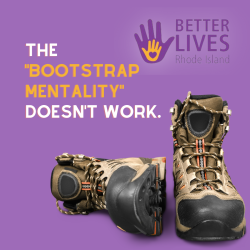-
Supporting Better Lives RI for 401 Gives
On April 1-2, 2024, Rhode Islanders will come together for a powerful cause – 401 Gives. This virtual fundraising event, powered by the United Way of Rhode Island, is a beacon of hope for local nonprofits like Better Lives RI. We strive to make a positive impact on low-income communities throughout the state, and your support during 401 Gives is crucial to our continued operations.
Our food pantry, meal site, and outreach program all depend on financial contributions from people like you. We fed thousands people in 2023, and we’re striving to help even more people in 2024!
Better Lives RI stands on our dedication to our clients. Our people-first philosophy means that every person in need gets direct, personalized attention.
We are acutely aware of the rising cost of the products needed to survive. When Better Lives RI does not receive specific donations, like meat for our food pantry, we front the cost, which can impact other resources that Rhode Island’s working poor rely on.
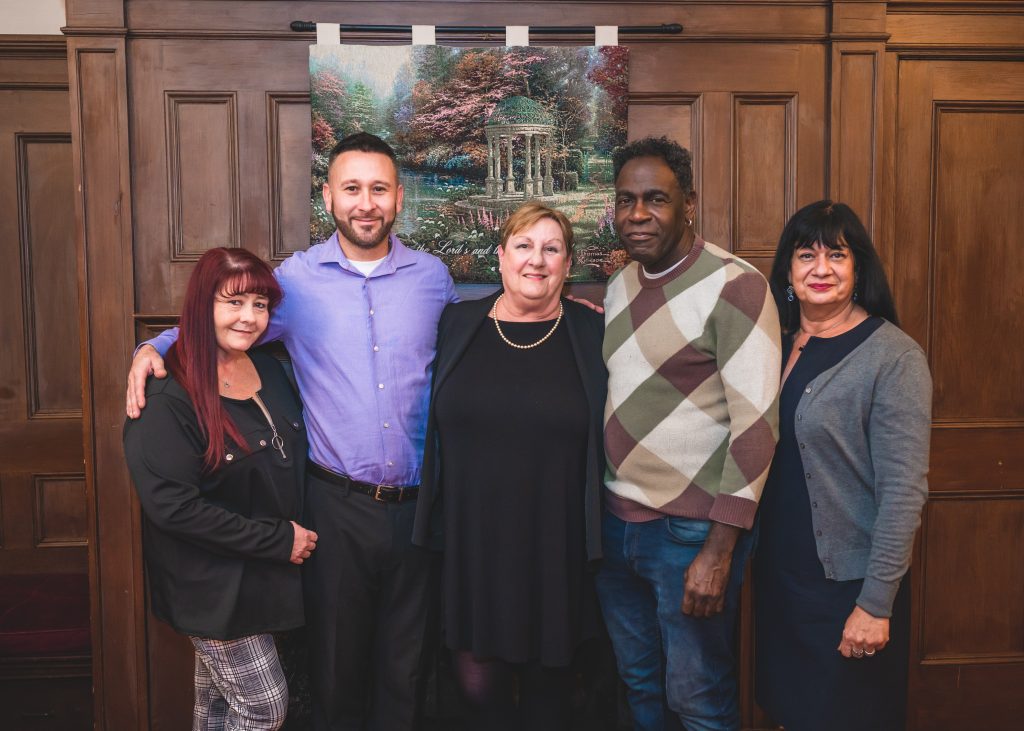
Additional expenses include:
- Buying protein (eggs, milk, chicken) for our food pantry when the food bank has none,
- Buying fresh produce for our food pantry when the food bank has none.
- Buying the ingredients to cook and serve 160 meals every week.
- Offering those newly unsheltered a tent, sleeping bag, clean socks, or a pair of boots
- Purchasing a birth certificate which is mandatory for getting housed.
How to Contribute
Starting at 6 AM on April 1 and running through 6 PM on April 2, donors can head to Our 401 Gives Page and search for Better Lives Rhode Island. From there, you can donate directly online with a secure checkout system. A minimum donation of $5 is required for your donation to be accepted.
The next best thing you can do is share our story. Sign up for 401 Gives updates, and follow us on Facebook and Instagram!
Thank you for making a difference in the lives of Rhode Islanders.
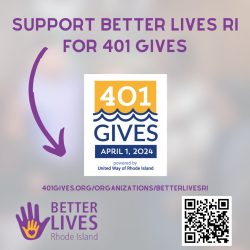
-
Snow, Rain & The Unhoused
The first snowfall hit Rhode Island this January in over a year. While snow makes for picturesque scenery in Rhode Island, it sets a daunting challenge for our low-income and unhoused neighbors.
At Better Lives RI, we recognize the pressing need to address the needs of struggling families. However, these needs are amplified by snowy weather, which brings a series of damages to those unprepared or ill-equipped to face the winter.
The Cold Reality – Health Risks:
The immediate health risks posed by winter weather are significant. Frostbite, hypothermia, and respiratory issues become heightened concerns as temperatures plummet. Exposure to extreme cold not only exacerbates existing health conditions but also puts individuals at risk of life-threatening complications.
Rhode Island residents living in encampments, tents, or under bridges deal with the consequences of snow and it’s aftermath; when the snow melts, it can wash away resources, dampen clothes, ruin food supplies, and force movement to safer, higher grounds. Wet, dirty tents and clothes don’t make for a healthy situation, especially for the unhoused
Mental Health Impact:
Enduring harsh weather conditions without proper shelter takes a toll on mental health. The struggle to find warmth and safety exacerbates stress and anxiety — many are left wondering when they will ever feel warm again. Winter outreach programs must address not only physical health but also provide vital mental health support. Better Lives RI is committed to recognizing and addressing the well-being of those we serve.
Solutions and Support:
Better Lives RI is dedicated to providing solutions and support to mitigate the health risks associated with homelessness during winter, but we cannot do it alone. Year-round, we work to connect low-income and unhoused Rhode Islanders with services that can secure them permanent housing, employment, and the opportunity to thrive.
Additionally, you can take the crucial step of contacting your elected representatives, who can use their positions to procure resources for people living in tents, under bridges, or in alleyways.
A full list of Rhode Island representatives is available here.
Your support makes this possible. Donate today at BetterLivesRI.org/donate.
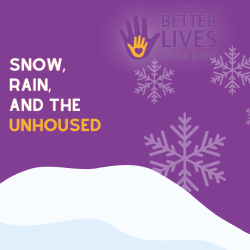
-
Unwrap Kindness: Better Lives RI Holiday Giving
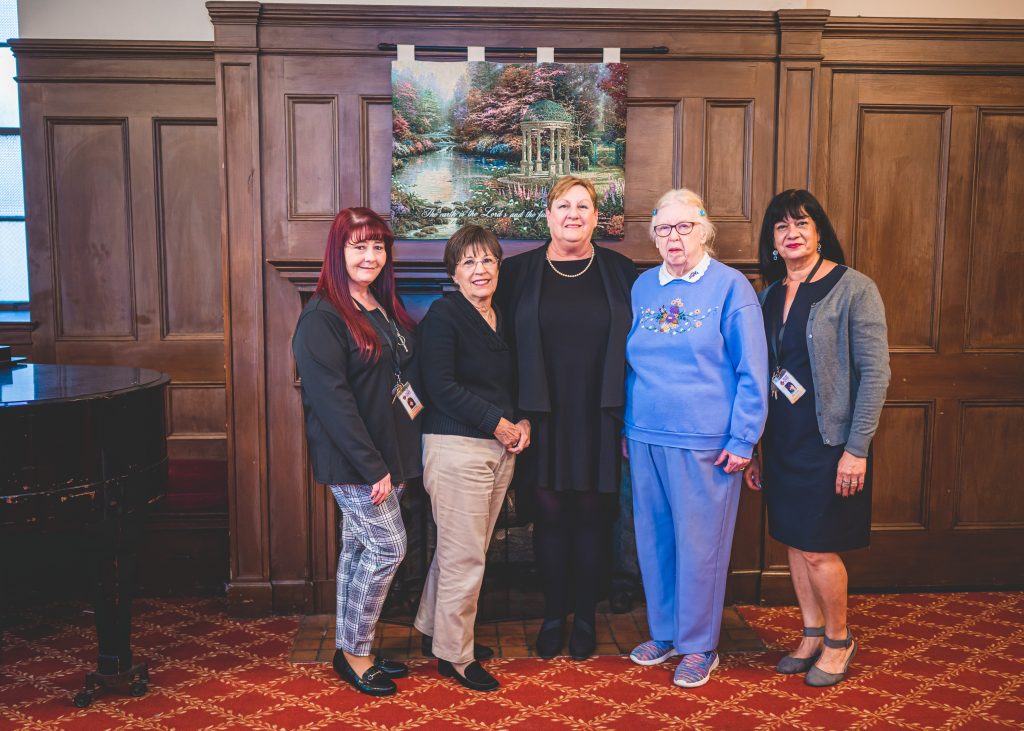
The holiday season is a time of warmth and joy. Most importantly, it is a time for giving. At Better Lives RI, we believe in the power of kindness and the incredible impact it can have on individuals and communities.
As we immerse ourselves in the holiday season, let’s not forget that working families in Rhode Island are living paycheck-to-paycheck with no guarantee of where their next meal will come from.
For nonprofits like Better Lives RI, we rely on holiday giving to start the new year strong. Up to 31% of annual charitable contributions happen in December, and we hope you consider Better Lives RI for your annual giving.
The holiday season is more than just a time for celebrations. It’s a time to extend our hands and hearts to those facing challenges, hardships, and uncertainties. Our commitment to fostering positive change and creating better lives for Rhode Island’s unhoused and low-income families is at the core of everything we do.
How We Make a Difference
Throughout the year, we work tirelessly to offer outreach and support that gets Rhode Islanders employed or connected with housing opportunities — alongside our weekly meal site and food pantry, our ultimate goal is to make the lives of struggling Rhode Islanders more well-rounded and lead them back to a state of self-sufficiency.
Hunger should never be a concern, especially during the holidays. Better Lives RI volunteers work tirelessly to stock our pantry shelves and to put together nourishing hot meals on Friday nights. For many, it is their only hot meal of the day. As the weather gets colder, a nourishing hot meal is crucial — a $15 donation helps to make these meals possible
Our commitment to building a better community doesn’t stop during the holidays. Whether it’s volunteering at shelters, organizing drives, or supporting educational initiatives, we strive to create lasting positive change in the lives of those around us.
The spirit of giving knows no bounds, and you too can make a difference. Your support, whether through donations, volunteering your time, or spreading awareness, contributes to our collective efforts to make this holiday season brighter for everyone. Something as simple as sharing our message on social media can expand our reach and help us to connect with potential donors.
Wishing you a holiday season filled with love, warmth, and the spirit of giving!
Warm regards,
The Better Lives RI Team
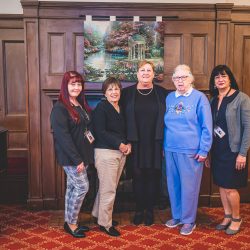
-
Prepare for Giving Tuesday
At Better Lives Rhode Island, our mission is clear: we help people better their own lives. For nearly five decades, we have been serving the needs of low-income and homeless individuals and families, making a significant impact on the lives of our friends and neighbors. As a Charitable Organization, these services are free to those who need them but are certainly not free to us.
Homelessness is expensive. According to Global Giving, “The government spends an average of $35,578 per year for every person who must endure chronic homelessness.” That is footed by the taxpayer. Meanwhile, a donation as small as $5 can help a Rhode Islander get the background check necessary to apply for housing or work, with the assistance needed to maintain self-sufficiency.
What sets Better Lives RI apart is our one-on-one approach. We believe that personalized care and attention can make a world of difference in helping individuals overcome challenges and improve their lives.
These days, we can provide essential services to over 62,000 people annually. Our dedication to offering stability, justice, and hope to those in need is evident through our three program areas. We understand the importance of accessibility. All our services are provided free of charge and are made possible through grants and the generous support of individual donors.
- Food Security: We operate a Food Pantry that brings necessary nutrition to struggling Rhode Islanders. We also conduct a weekly meal site that has fed over 45,000 people in 2023.
- Homeless Outreach: Our homeless outreach program provides intensive, holistic case management to over 150 unsheltered individuals every month. We are committed to helping those experiencing homelessness find a path to stability.
- Support Services: Our personalized approach extends to all our services, ensuring that every interaction is tailored to the unique needs of the individuals we serve.
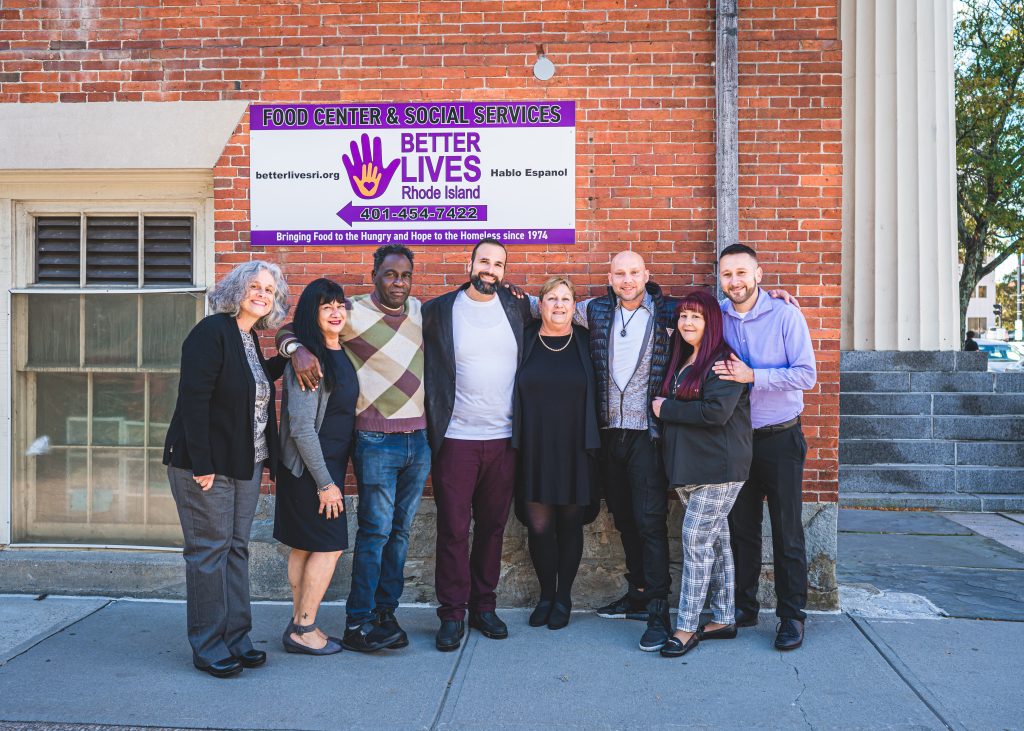
Our services are made possible by generous donors who support our mission and unhoused Rhode Islanders in need of assistance. Together, we can make a significant impact on the lives of those who need it most.
We’ve experienced firsthand the impact that Homeless Outreach can have on a family.
From Executive Director, Paula Hudson: “Very early in my Better Lives RI career, a family came to us for help. Mom and Dad were living in a truck, their five-year-old son was staying with a relative, and Mom was seven months pregnant. We (Me, Mom & Dad) all worked tirelessly to get them out of the truck and into a home. On the day Mom delivered a baby girl, Dad was at Providence Housing Authority receiving their Section 8 voucher. The following week they signed a lease on a beautiful apartment.”
Charities are struggling. Without public support, Rhode Islanders in need could become another statistic in a system that does not prioritize the needs of the unhoused. Better Lives RI is a crucial resource to prevent malnutrition, rehouse the homeless, promote self-sufficiency, and save lives. People rely on us, and we rely on donations to make help possible.
This Giving Tuesday, Help bring dignity to those struggling in the Rhode Island community by donating to Better Lives RI today!
If you’d like to learn more about our services or get involved, please don’t hesitate to reach out to us. You can contact us at 401-454-7422 or via email at phudson@betterlivesri.org.
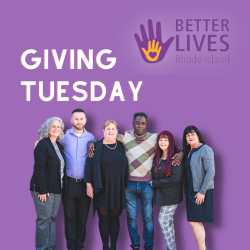
-
Clothing Matters
Clothing Matters
The ongoing housing crisis and financial strain put vulnerable unhoused Rhode Islanders at significant risk. In the past, we’ve discussed the hygiene gaps faced by the unhoused, but a unique struggle comes in the form of clothing. Despite over 21 billion pounds of textiles being wasted every year, the homeless population struggles to obtain socks or blankets.
Did you know that Better Lives RI was able to distribute 200 blankets to those living outside and offer clothing to 100 + individuals in the past six months? With the limitations faced by the unhoused, our work is never done — that’s why fundraising is so crucial, especially as we head into frigid winter weather conditions.
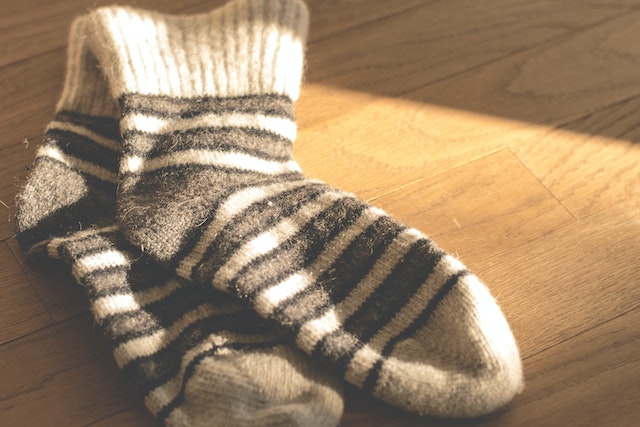
The Importance of Clothing
Clothing is synonymous with comfort. We wear what reflects us, and we are fortunate that our closets are full of options. If you’ve ever looked in your closet and thought “I don’t know what to wear,” consider yourself lucky! Not everyone can choose what to wear.
Did you know that clean socks are essential to our health? Dirty, muddy, and overworn socks can lead to skin infections, irritation, and excessive odor. It’s more than just a person’s self-esteem, it’s about their health, safety, and comfort. Outdoor conditions are unforgiving, and we must do everything we can to bring comfort to those in need.
Clothing Isn’t Forever
With limited storage and resources, an unhoused person may only have space for a few days’ worth of clothes. As we’ve discussed before, only 4.6% of the unhoused can wash their clothes regularly. This poses its own unique health and safety issues for Rhode Island’s unhoused.
Consider the housing situation. While Better Lives RI can secure emergency shelter in times of inclement weather, an unhoused person may be forced to leave their tent and supplies behind, leading to further damage to their supplies. Clothing and warming materials are essential — when they are damaged by mud or rain, the safety risk worsens. You wouldn’t use a muddy blanket when you’re trying to sleep. Unfortunately, that is the reality for many of our unhoused.

How We Can Help
Better Lives RI Outreach Case Managers help our clients secure the necessary tools to survive and thrive. Every case is unique, but they all deserve our equal, undivided attention. We’ve also distributed 300+ pairs of socks this year thanks to our donors.
Our team works tirelessly to get the unhoused off the streets and back on track. Winter is coming and our homeless clients as well as our working poor neighbors need blankets, jackets, and winter hats. Our offices at 12 Abbott Park Pl Providence, RI 02903 are accepting new and gently worn coats to be dispersed to Rhode Islanders in need.
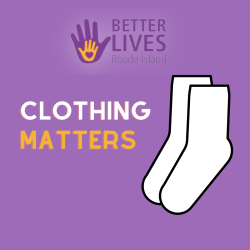
-
Recognizing Hunger Action Month
Every September is Hunger Action Month, As recently as 2021, over 13 million households in the United States were facing food insecurity — that means a slew of families are at risk of poor physical and mental health.
You may be asking: What can I do about it? How can I help? Read on to find out.
How Hunger Starts
Poverty continues to be the largest contributor to hunger. Data shows that 1 in 3 families suffer from food insecurity in Rhode Island. With the increase in prices of everything and inflation many, many people are forced to choose between buying medications, paying rent, paying utilities, and buying food. When a person lives week-to-week, they’re forced to sacrifice certain necessities — particularly food.
Food Deserts
Food deserts are residential neighborhoods where access to food is significantly low. Because of their significance, Food Deserts have been deemed an environmental health issue. And we have deserts here in Rhode Island. When a grocery store isn’t easily accessible, residents become dependent on dollar stores, gas stations, or fast food restaurants — further affecting health and nutrition.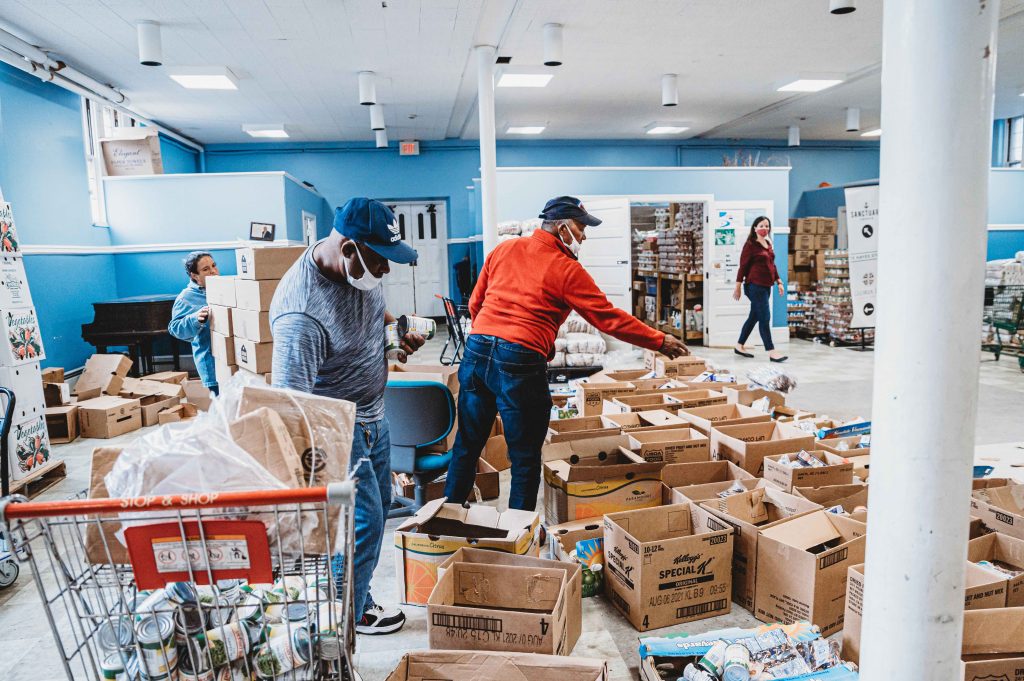
Combatting Hunger
In the Ocean State, 1 in 3 families face food insecurity.
Did you know that Better Lives RI fed 45,600 hungry Rhode Islanders last year? Yes, you read that correctly, they fed 45,600 hungry Rhode Islanders and are on track to feed that many and more this year. But they cannot do it alone.
The Better Lives RI team works diligently to stock our food pantries, as well as our weekly Friday Meal Sites. Case Workers assist our most vulnerable by securing them the documentation necessary to apply for jobs and housing, to become self-sustainable. They cannot continue their mission on their own they need you.
You can address the issue of hunger by helping BLRI help others through your donation and remember every dollar makes a difference. Thank you.
Help us this Hunger Action Month by setting up a recurring donation with Better Lives RI!
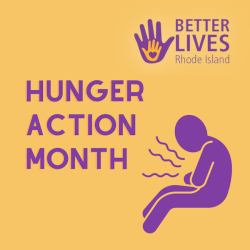
-
Extreme Temperatures and the Need For Shelter
Rhode Island has seen some interesting temperature fluctuations this summer. According to WJAR, the average temperature in the summer is on the rise, with Providence seeing more than 11 days above 85 degrees Fahrenheit — the most in over 50 years.
Many of us are fortunate enough to have permanent shelter with fans, air conditioners, cold water, and shade. For Rhode Island’s homeless population, a lack of permanent shelter can have disastrous effects on health, particularly during periods of record heat or record cold temperatures.
Consequences of Extreme Heat
According to the CDC, your health can be affected by heat exposure in as little as 10 minutes! Heat stroke, one of the most serious heat-related illnesses, occurs when the body is no longer able to regulate its heat. The body may rise to temperatures as high as 106 degrees Fahrenheit. If the body stays at a high temperature for too long, it can lead to organ damage or even death.
Other consequences of long-term heat and sun exposure include sunburns, dehydration, nausea, cramping, heat rash, extreme thirst, and fainting.
The top suggestions to prevent heat stroke, heat exhaustion, or sunburns are to avoid excessive sun exposure, stay hydrated, or shelter in a cool area like an air-conditioned building or vehicle. With limited shelter available to the unhoused, this puts them at a greater risk for heat-related illness.
The Effect on the Unhoused
Mother Nature does not discriminate when it comes to extreme heat — anyone who is outdoors for an extended period runs the risk of heat stroke. However, many of us are privileged to have a place to go and avoid the heat.
The homeless face a unique danger that demands our attention; the National Health Care for the Homeless Council acknowledges that particularly young or old homeless citizens are at risk due to being malnourished, exhausted, and lacking access to food, water, sunscreen, and protective equipment like sunglasses and clean clothes.
How Better Lives Helps the Homeless Combat Inclement Weather
The first step, of course, is outreach. Our case managers work to keep track of our unhoused community. Outreach not only brings hope and support — but it improves the chances of accessing emergency shelters during extreme weather conditions.
The second step is securing shelter spaces. Cities and towns across the state have cooling shelters to keep Rhode Islanders out of dangerous conditions, but these shelters are always at risk of reaching capacity, particularly as summers become hotter and hotter.
The ultimate goal, through our services, is to connect the unhoused with the resources to become self-sufficient in a safe space. Through case management, our team works with the unhoused to secure the documentation necessary that help them apply for jobs and housing. Along the way, our team works to connect those on the streets with emergency shelters in times of inclement weather.
Helping the unhoused is a round-the-clock task. Weather conditions pose a unique challenge, and with your support, we can fight to lower the risk of heat-related illnesses and death among the unhoused.
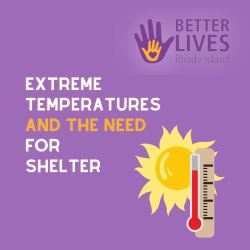
-
Sanitation Challenges Faced by the Unhoused
The unhoused face many daily challenges. One that is taken for granted by most is access to a bathroom and shower. For the unhoused, bathroom access is a challenge. How often do we see signs on doors “No Public Bathrooms” or “Bathrooms are for Patrons Only.”
A daily hygiene regimen is crucial for good health and for the prevention of spreading diseases such as Bacterial Skin Infections; Viruses and Parasites; Diarrhea and Other Gastrointestinal Distress; Ear, Nose, and Throat Infections; and Gingivitis, Cavities, and other Oral-Related Infections
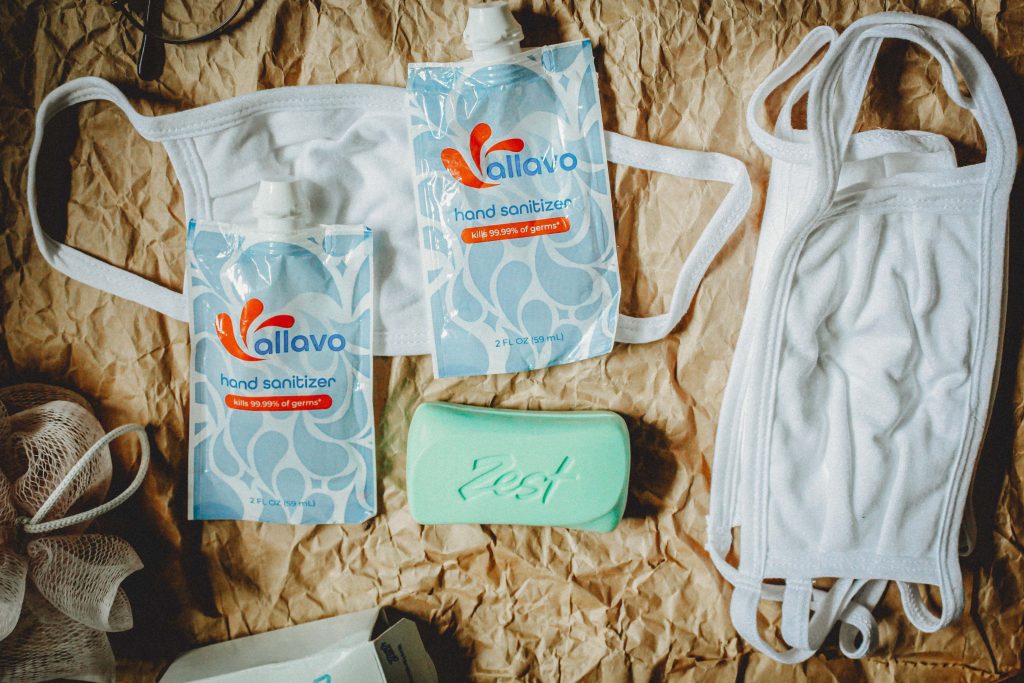
Access to Sanitation
According to the National Library of Medicine, a staggering 59% of unhoused people rely on homeless shelters for showers. However, with limited resources and overcrowding, shelters often struggle to meet this demand, and not everyone who shows up requesting a shower may receive one.
Think about that: A person with a gym membership, for example, may have on-demand shower access right after a workout. An unhoused person may spend multiple days in the hot sun without clean clothes, and only receive one shower a week if they’re lucky. For many of us, daily showers are a necessity. Unfortunately, not everyone has that access.
Maintaining proper hand hygiene is crucial for preventing the spread of diseases, yet 89.2% of unhoused people rely on hand sanitizer as their primary hand-washing method, as reported by the National Library of Medicine.
Due to limited access to clean water and soap, hand sanitizer becomes a substitute, but it’s simply not enough. This reliance on hand sanitizer leaves individuals vulnerable to health risks and increases the likelihood of infections. Using alcohol-based products on cuts, scrapes, or wounds is not recommended, as it prevents healing. Soap and water are much gentler on the skin!
Another by-product of water inaccessibility is no clean clothes. Shockingly, 4.6% of unhoused individuals are never able to wash their clothes, exacerbating the challenges they face daily.
What this Means For the Unhoused
Society puts a lot of weight on personal hygiene; individuals will (and have) judged a person’s character based on their hygiene. Being considered unsanitary in public spaces can remove you from restaurants, buses, stores, and more.
It can also be a tremendous barrier to employment; improper sanitation can be a non-starter for job seekers in the food & hospitality industry, among other job opportunities.
On top of the expectations to have some form of job experience or education, there are “social norms” to consider in the workplace. Sanitation practices are at the top of that list — even if a person is perfectly qualified, they may lose out on a job due to their clothes and grooming practices. When you’re unhoused, this creates a vicious cycle that is nearly impossible to break out of. How can a person secure housing without a job, and how can a person secure a job without housing? It’s an unfair cycle, and many are forced to go through it alone. That needs to change.
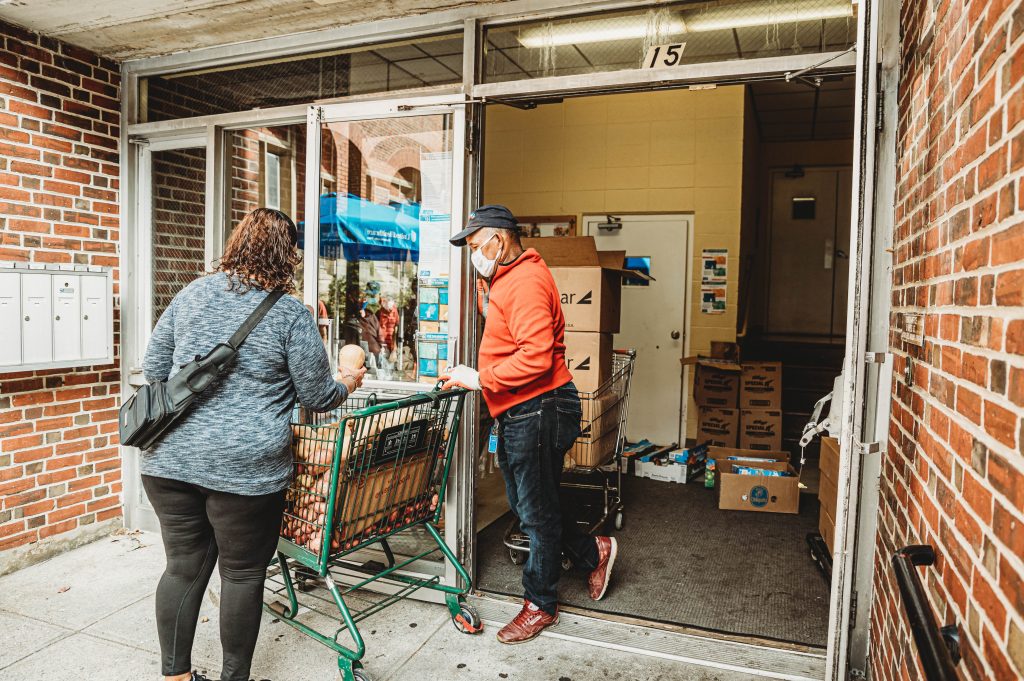
Addressing the Crisis
The first step is outreach; connecting Rhode Islanders with the necessary resources to thrive plays a big role in their growth. A shower after a long, hot day can feel emotionally and physically regenerative — imagine the impact it has on a person who hasn’t had a shower in weeks.
Empathy is also important. Words like “dirty” or “gross” are demeaning, and blame the unhoused for their condition. There is a multitude of reasons why a person may have improper hygiene, and we as a society can make a difference by not passing judgment on others’ situations.
Better Lives RI has been offering this type of support for decades. With your donation, we can connect the unhoused with the resources for survival — including sanitation stations. Our efforts lower the barriers to food access, emergency shelter, and documentation services like background checks, birth certificates & more.
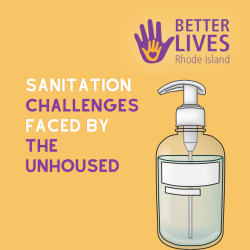
-
The Bootstrap Mentality: Understanding Homelessness and Poverty
You may have heard that all you need to succeed is to “pull yourself up by the bootstraps.”
The “bootstrap mentality” is a school of thought that promotes self-reliance and hard work as the sole factors of success. Of course, the concept can be motivating to reach one’s personal goals (like reducing financial spending, exercising, or overcoming workplace setbacks), but it can also have negative connotations — ones that have led to a flawed understanding of homelessness and poverty.
In the context of homelessness or unemployment, the bootstrap mentality suggests that individuals who are experiencing poverty are simply not working hard enough and aren’t taking responsibility for their misfortune. This view ignores the structural factors that contribute to poverty and homelessness. Rather than helping struggling individuals, the bootstrap mentality puts undue blame on individuals facing systemic barriers of entry that would secure them proper housing and employment.
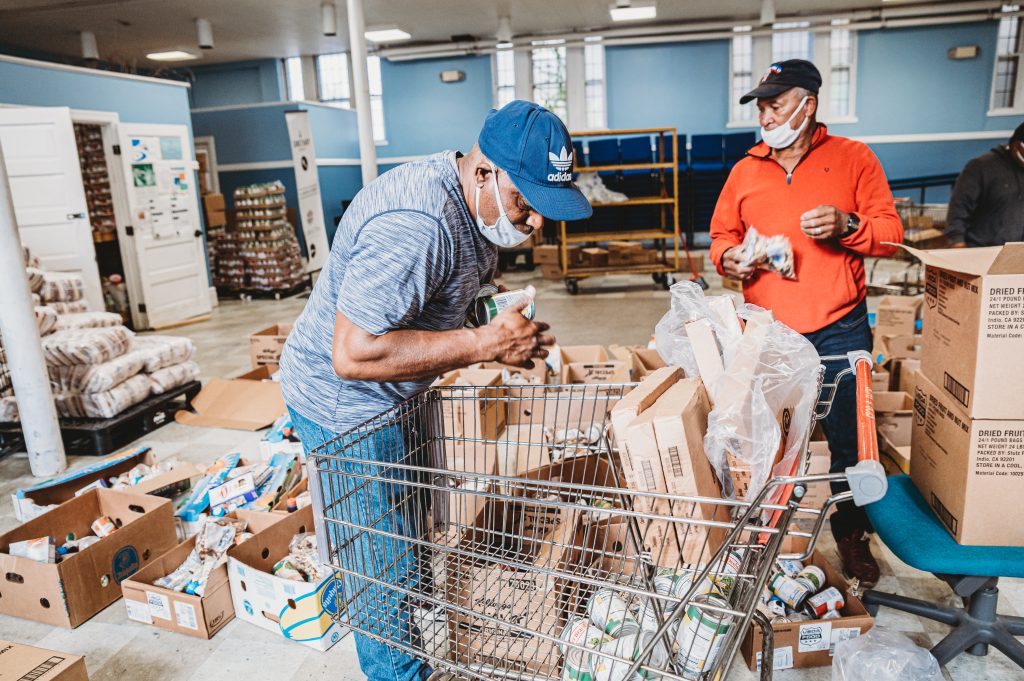
Everyone deserves a helping hand. It is important to understand that individuals who are experiencing homelessness and poverty are not lazy or lacking in personal responsibility. Many struggle to access the resources and support they need to improve their situation.
One significant barrier to accessing crucial resources is documentation. You’re likely familiar with all the documents needed to secure a job or housing: Birth Certificates, Social Security Cards, Paystubs & more may be required. Many individuals who are experiencing homelessness do not have access to basic identification required to apply for jobs or access social services.1 Without these documents, it can be nearly impossible to secure employment or access government benefits.
It is also important to understand that poverty and homelessness are often the result of systemic and structural factors, such as lack of affordable housing, low wages, and inadequate social safety nets. These factors can disproportionately impact marginalized people — people of color, the disabled, and the LGBTQIA+ community to name a few2. Understanding these high barriers to entry is crucial for developing effective solutions to address poverty and homelessness.
The bootstrap mentality, in the context of homelessness or poverty, sets a problematic stigma that all persons in difficult financial situations have done so to themselves and therefore can get out of these situations by working harder3. That’s simply not true. Homeless individuals who don’t have jobs are not lazy but are often facing significant barriers and challenges. Access to resources and support, including basic documents like IDs and birth certificates, is essential for individuals who are experiencing homelessness.
It is important to recognize the systemic and structural factors that contribute to poverty and homelessness and work towards developing effective solutions to address these issues.
Better Lives works closely with the unhoused community to secure their access to documentation, emergency shelter, and public transportation.
1 https://stateline.org/2017/05/15/without-id-homeless-trapped-in-vicious-cycle/
3 https://rachelwayne.medium.com/the-problem-with-the-bootstrap-mentality-fa783d7bf710
